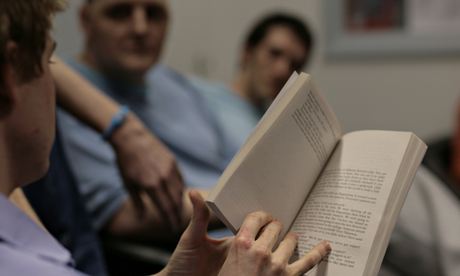
Prisoners can no longer receive books as gifts. This terrifies, and so it should: civilisation is made of books – and where, even Conservatives can surely admit, is there a greater need for them than in "the prison estate" that is disproportionately filled with the illiterate?
Administrations that hate books ordinarily hate people too. The obvious quotation is from the 19th-century German poet Heinrich Heine: "Where they have burned books, they will end in burning human beings", he wrote in his play Almansor. He was talking about Spanish Catholics burning the Qur'an to chase Muslims out of the Iberian peninsula, and for his prescience his own books were burnt in the Opernplatz in Berlin by – need we say it? – the National Socialists. It was a kind of awful remembrance.
The row, which began on Monday with a furious piece by Frances Crook of the Howard League for Penal Reform, charges the justice secretary, Chris Grayling, with anti-intellectualism (a reasonable charge against a government that routinely ignores expertise and misuses data to further its ideological agenda) and "an irrational punishment regime", or sadism by deprivation; children live in custody too (1,200 as I write). I would add populism and political ambition: why does Grayling routinely make his announcements to the Conservative lobby hacks who don't know what questions to ask him?
The ministry's response was as robust as any stick: "Let's be clear about one thing," Grayling said, even as he defended a policy that contradicts his own statement. "Prisoners' access to reading material is not being curtailed." Each prison has a library, we were told – which is true; and each prisoner can take out 12 books at a time. Grayling accused his critics of "wilfully stoking up misconceptions", seeking to damage "those whose offending behaviour it is that we are trying to stop".
Is he telling the truth? The obvious question is – as the number of prison officers falls, and the public sector tries to imitate the lower costs of private prisons – how much access does an average prisoner have to a prison library? The Ministry of Justice, for some reason, does not publish figures relating to this, although it does publish the minister's insistence that access to books is not restricted. So we must rely on anecdote and testimony.
The Prisoners' Education Trust carried out a survey last year on access to libraries via InsideTime, the national monthly newspaper for prisoners. Of 343 respondents, 40% praised provision, while 28% called it "average" and 32% "poor". One respondent from HMP Rochester said: "The library access here is abysmal … the staff rush us out as soon as they can, even if the library is empty." Crook has received a letter from an inmate at HMP Belmarsh insisting he has had no access to a library for four months.
Simon Short, who lived in 25 prisons over 16 years until he did an Open University degree and founded a business employing ex-offenders, says that some of the prison libraries are "not fit for purpose. Books set me free. They were fundamental to my rehabilitation." (Despite Grayling's actions, this is still established wisdom. Even a minister cannot unmake the truth.) All of which suggests that access varies from prison to prison, and is declining with staff cuts, which are a certainty. The Howard League is set to publish data on this: on one recent day at HMP Pentonville, it notes, there were just 89 staff to 1,200-1,400 prisoners, which does not allow for a lot of library tours.
Prisoners can still buy books under the Incentives and earned privileges scheme, which is designed to ensure compliancy. But the average prisoner earns £8 a week, an amount which has not increased for a decade, and from this must buy toiletries, extra food, stamps (because stamps are not allowed to be received as gifts either) and, perhaps, tobacco. What is left for books, which are expensive? Moreover, understaffing limits opportunities to do activities that will enhance prisoners' privileges and bring them more money to spend. Inmates may also not have the skills to do the activities, because they have not read books.
This, of course, is a catch-22, and leads to a hollow dystopia where, with restricted contact with the outside world and fewer books to read for pleasure and mental sustenance, rehabilitation is threatened. Even to those who care only about social stability, and rather less for what Heine might say about them, this is an abysmal policy.

